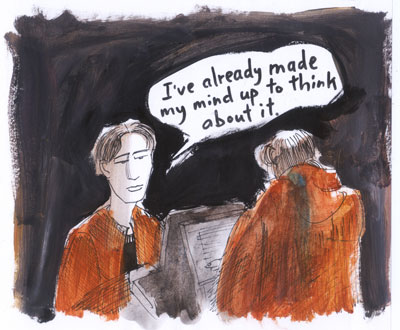 Every Saturday, we’ll be posting a new illustration by David Lester. The Mecca Normal guitarist is visually documenting people, places and events from his band’s 28-year run, with text by vocalist Jean Smith.
Every Saturday, we’ll be posting a new illustration by David Lester. The Mecca Normal guitarist is visually documenting people, places and events from his band’s 28-year run, with text by vocalist Jean Smith.
Prior to Diebenkorn‘s warning that we were getting too big for our britches, new was what was eventually old and yet still important and valued. We hadn’t started making bad new yet. Post-war new was not going to leave the same pleasant stain on our future, not in the way previous newness had. Post-war architecture included New York’s high-rise apartment buildings. Post-war L.A. saw the paving of nearly 4,000 centerline miles of freeway. A foreboding lurked in the way Diebenkorn moved paint around, like an old car pushing through snow or sand, unlike the views from rooms in Bonnard’s portion of France where a fruit tree and a door standing open from his kitchen happily partook of the same plane of value shared by his wife in the bathtub upstairs and his mid-breakfast table settings. This was life being lived, but when Diebenkorn smoothed out life’s tired lines it still had edges. Did he really like the shape of wide open scissors, the knife—who puts a knife in a glass half full of what; water?—and the tines of forks with other cutlery, at the ready? For a meal or a Francis Bacon-like dissection? These were objects with edges, like his fields abutting freeways were edges, albeit they could be seen as lines, but perhaps we can go back to the missing line of expression on the sloppy-headed woman where there could have been a line, there were only the two colors and Nadine derived no emotion other than the one the painter projected, which was, in part, reminding us that the subject was going to remain mute. The subject’s emotional landscape was not there for the viewer to be seduced by, not while the painter had shadows to ply across sidewalks, to tell us about the time of day and the light in southern California, the way it fell, like all emperors and their empires eventually, across the land that had been stripped of nature, by allowing edges to speak, replacing or ignoring the expression of lines.






